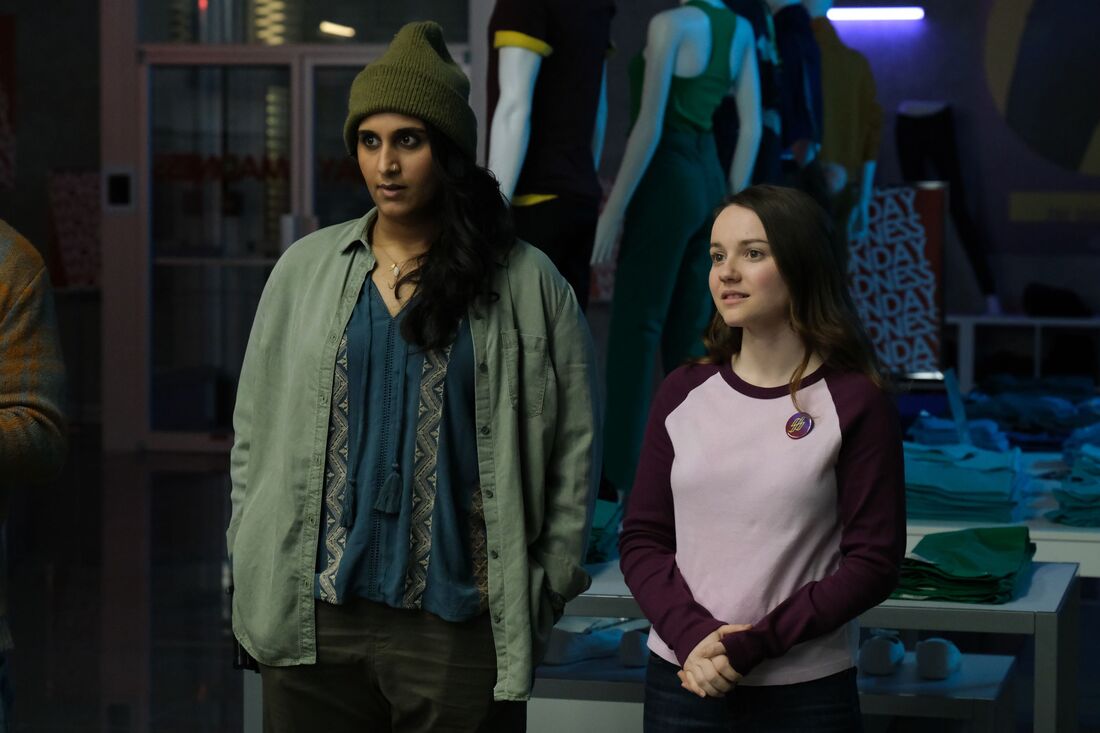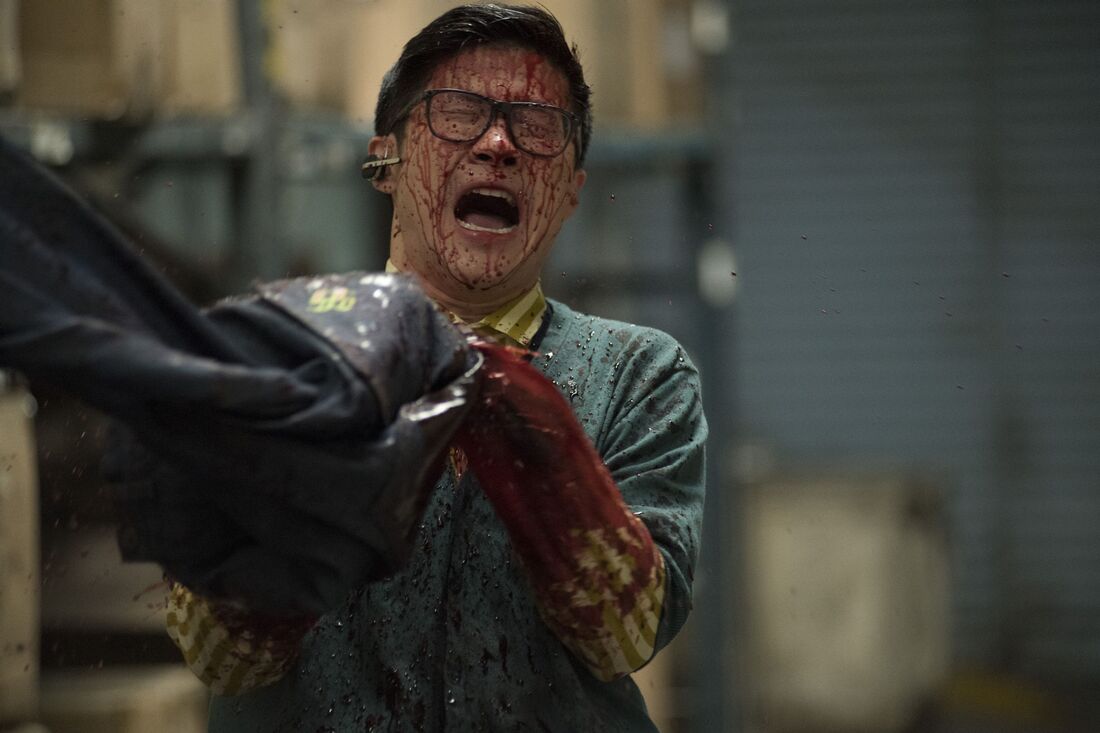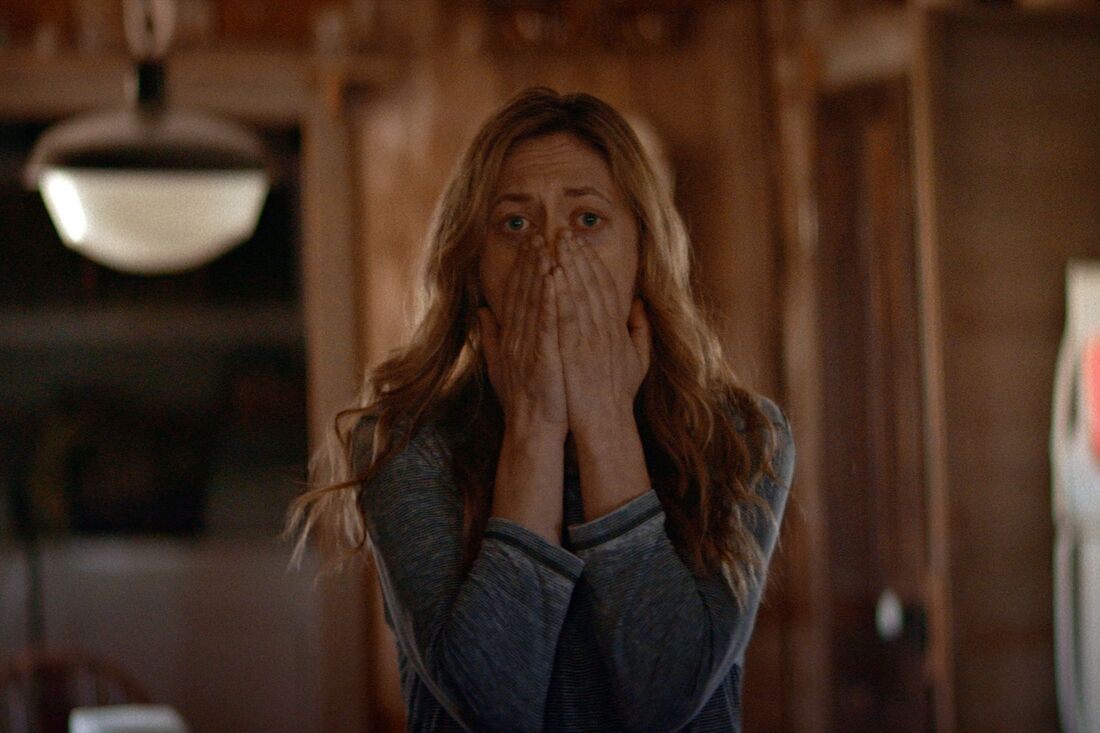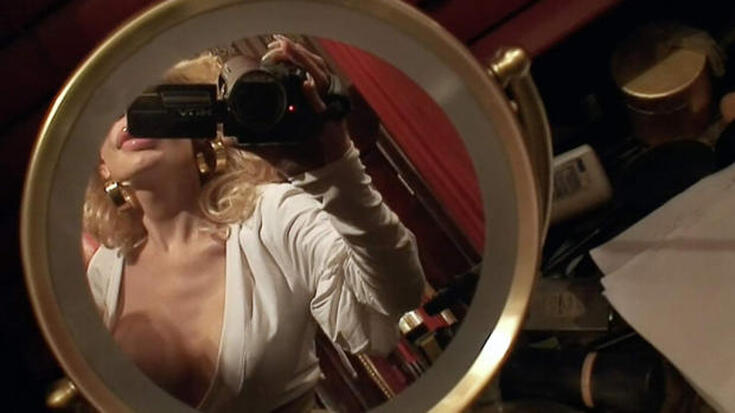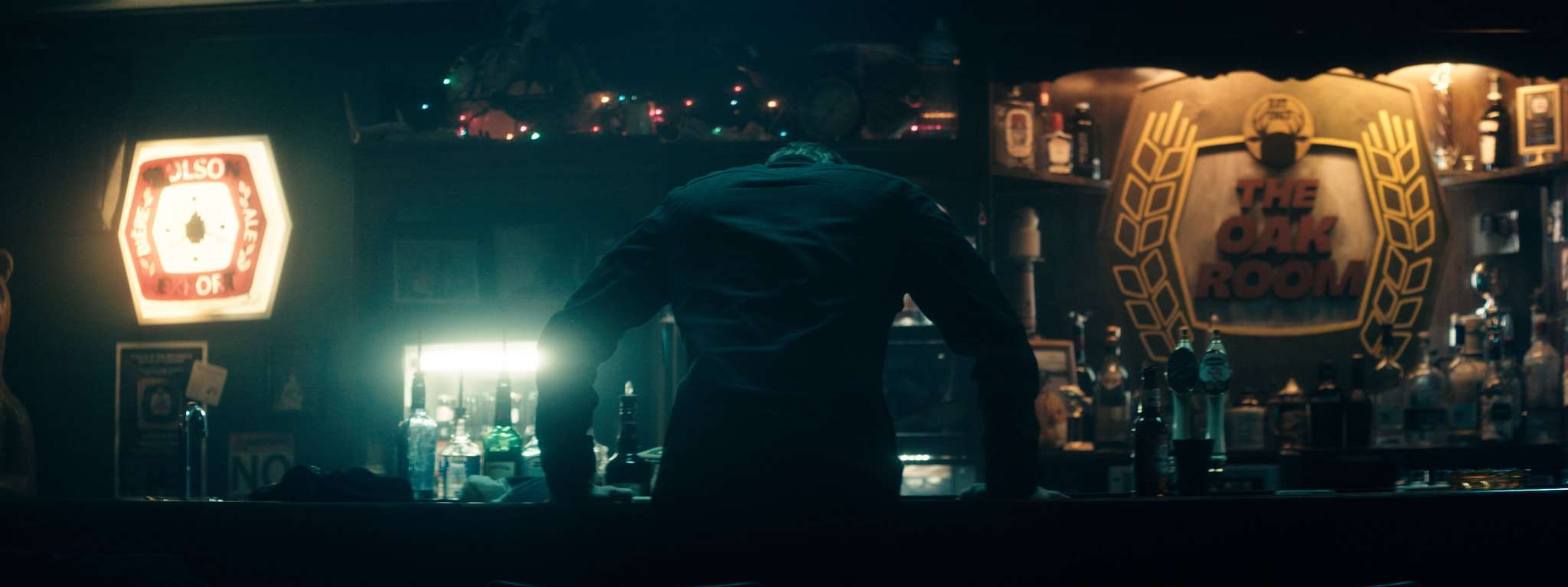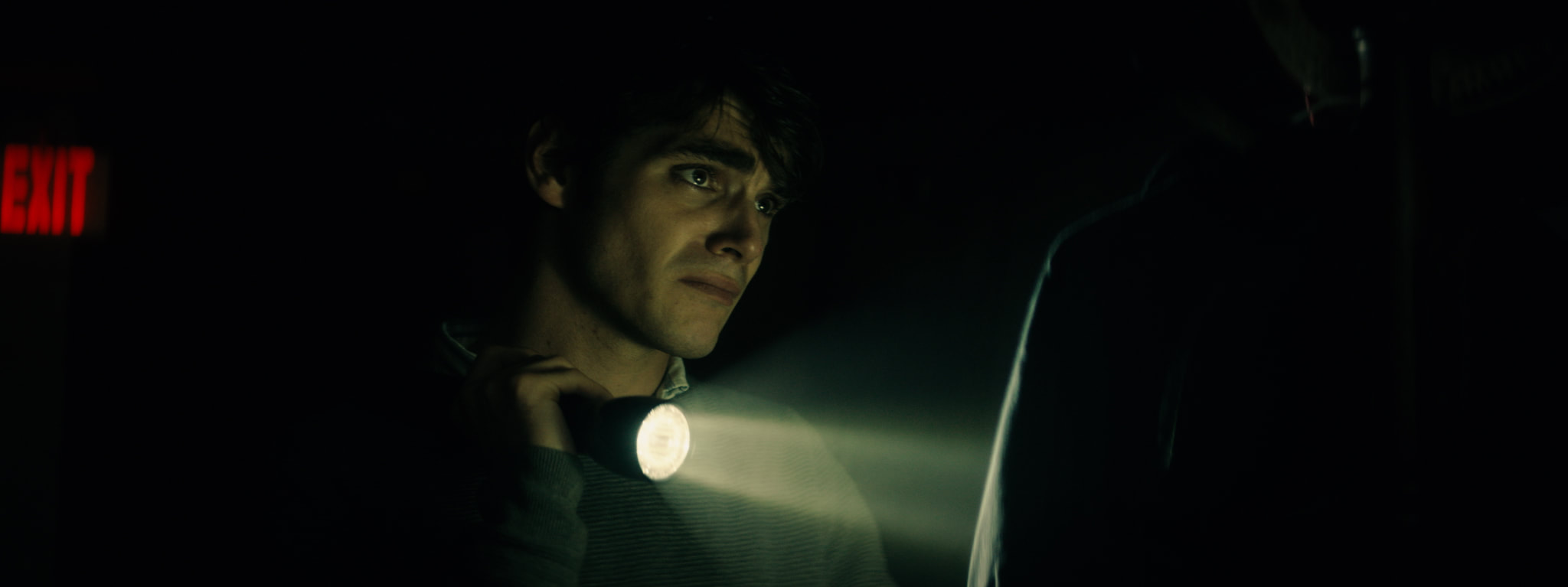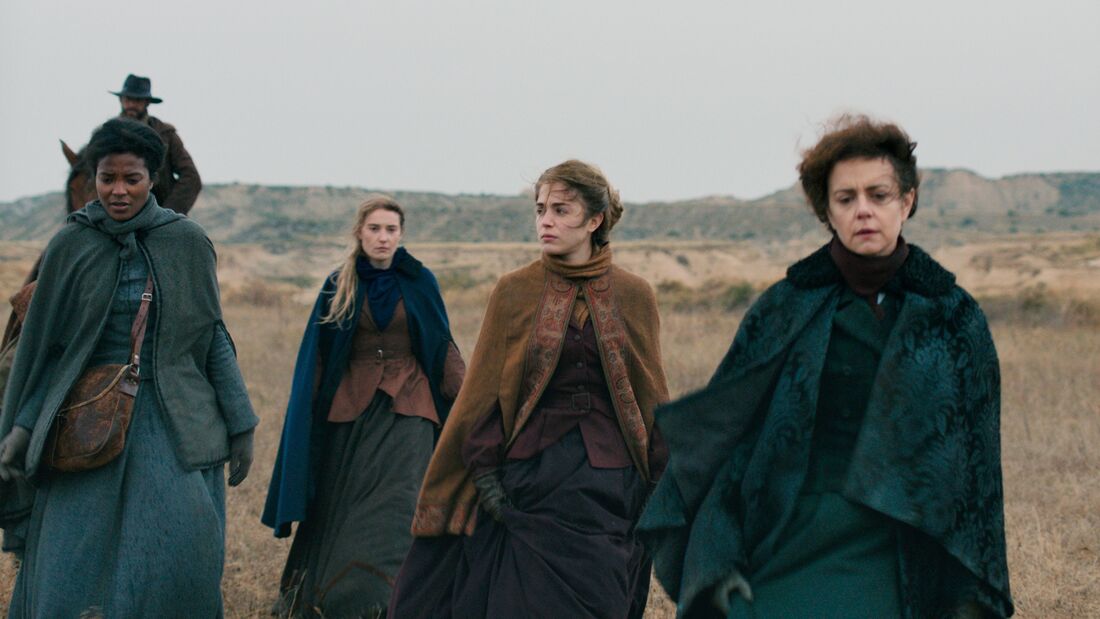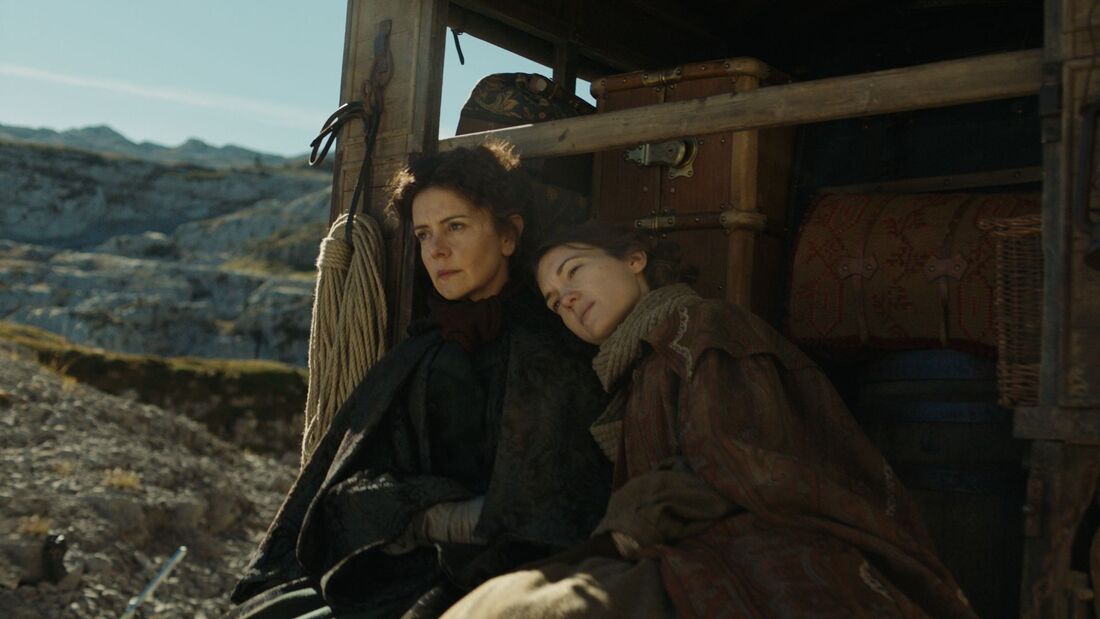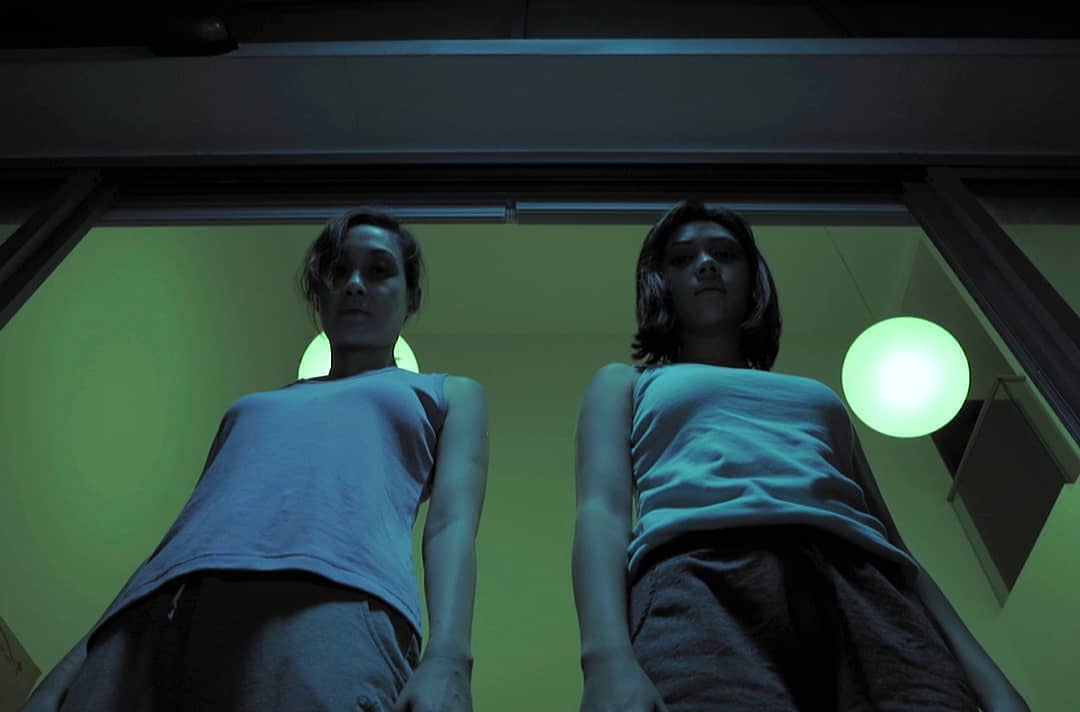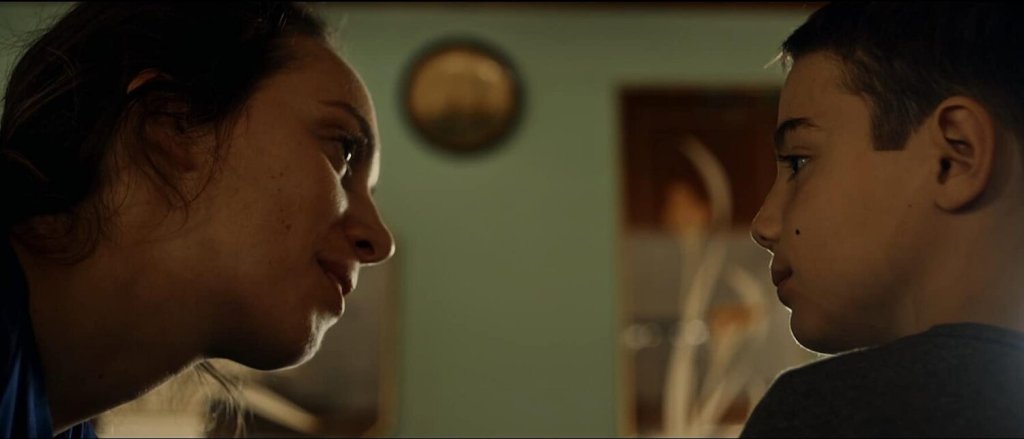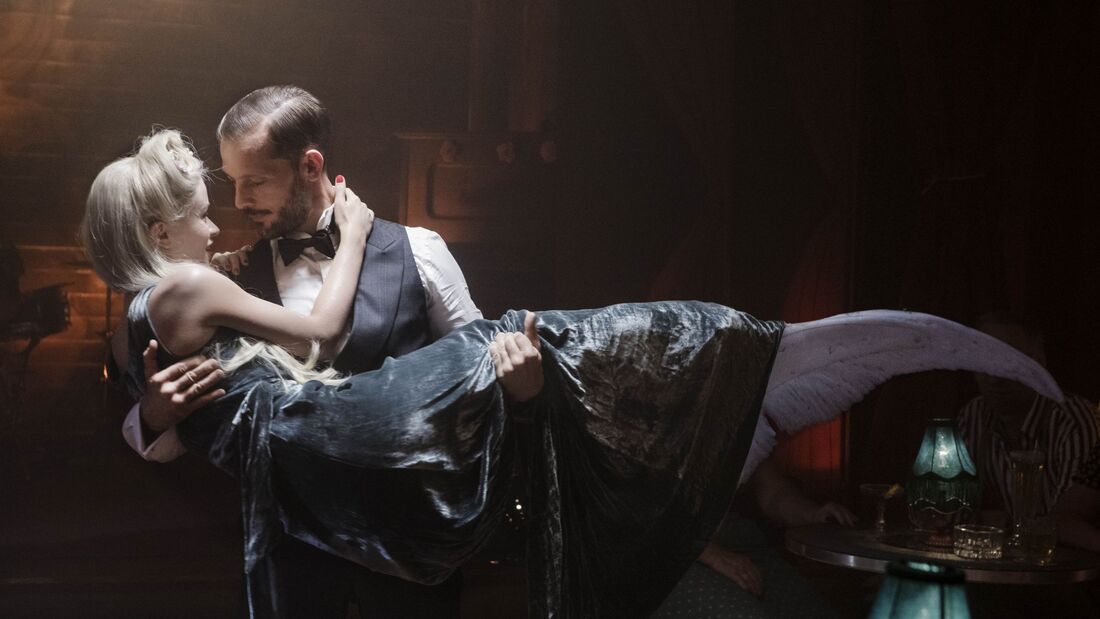|
Review by Sean Boelman
The “killer clothing” subgenre of horror is rapidly growing, and honestly, there’s no reason to complain. Elza Kephart’s wicked horror-comedy Slaxx is both a darkly hilarious satire of consumerist society and a gnarly slasher flick, making it an all-around satisfying late-night genre treat.
The film follows the staff of a trendy clothing store who are locked in overnight in preparation for a massive sale, soon discovering that one of their hot ticket items is a possessed pair of jeans with a thirst for blood. On paper, this premise sounds absolutely ridiculous, and to an extent, it is in execution as well, but the world that Kephart and co-writer Patricia Gomez build is so tongue-in-cheek that it works. It is clear from the opening moments of the movie that Kephart and Gomez have set their eyes on the hypocrisy of giant corporations as the target of their satire. Ultimately, a few of the twists end up being somewhat predictable because it’s obvious where they are heading with their “Big Business is evil” commentary, but the script comes from such a place of sincerity that it is refreshing nonetheless. The film isn’t very long, and that definitely works in its favor. Once the mayhem begins, it keeps going, and there’s never a point in which the movie slows its roll. The laughs start early and come frequently, and the kill scenes are both shockingly brutal and impressively creative. It achieves that right balance between scares and humor to be a great horror-comedy.
And while the film may be a B-movie at heart, Kephart does a lot of interesting things with the visuals. The effects that were used for the kills are excellent. Copious amounts of blood and gore cement its campiness. And the use of spatial geography is strong as well, making the confined setting feel a lot more expansive than it actually is.
If the movie does come up short in one area, that is its character development, although the shallow nature of the characters is almost fitting. In a film that is all about superficiality, it makes sense that all of the characters are archetypes. Even the protagonist, a plucky virgin (in this case a new hire in the world of retail) is part of this material world. The cast really gives it their all, though, giving performances that are gloriously hammy. Brett Donahue is probably the biggest standout as the flustered manager trying to keep everything under control, nailing the artificial smile that rules the service industry. Also great are Romaine Denis and Sehar Bhojani, who nail it as the heroes. Slaxx revels in its absurdity, making it one of the most enjoyably zany horror-comedies of the year. Insightful despite its unabashed wackiness, this is a cult classic in the making and will certainly be a favorite of genre fans for years to come. Slaxx screened as a part of the virtual edition of the 2020 Fantasia Film Festival, which runs August 20-September 2. Rating: 4.5/5
0 Comments
Review by Sean Boelman
Most horror flicks that attempt to be an exercise in style-over-substance end up falling short, but that is not the case with Brian Bertino’s newest film The Dark and the Wicked. While it does leave a bit to be desired in a narrative sense, it contains some truly horrific imagery that could very well haunt viewers’ nightmares.
The movie follows a family who finds themselves tormented by an evil force as they mourn their dying father. In terms of the plot, it’s a very simple film that is really little more than a good old haunted house story. But the dark imagination which Bertino brings to these supernatural tropes creates a truly terrifying result. If the movie does suffer from one thing, it is a lack of subtlety. In films that don’t have a strong plot, one expects there at least to be some thought-provoking content to draw things together. And while Bertino’s script does explore some ideas about grief and guilt, it’s often far too direct to be particularly profound. That said, these themes do provide a necessary foundation for the characterization. It’s easy to get wrapped up in this family’s woes as their world is torn apart by supernatural and psychological powers. Although the family dynamic definitely could have been more prominent, the anxieties of each of the characters on an individual level are clearly sympathetic.
Marin Ireland gives an excellent performance in her leading role. In the past, she’s proven herself to be a really valuable supporting player, but it is evident from this that she has the ability to carry a movie. The rest of the cast is good too, but more often than not, this is Ireland’s show, and she earns that spotlight.
Viewers familiar with the genre will definitely be caught off-guard by the film’s aggressive pacing. This isn’t some slow burn psychological horror. The moments of brutality are short but intense, and there is this mounting anxiety of trying to figure out what is going to come next. Bertino doesn’t leave room for the audience to breathe, much less relax. This movie wouldn’t be what it is without its disturbing imagery. And while Bertino is essentially using gore as a crutch, it’s so gnarly that it will elicit a guttural reaction. This is the type of film that, if it were to play to a full crowd, it wouldn’t be surprising to hear screams and gasps throughout… but it will be just as creepy at home alone. Bryan Bertino’s The Dark and the Wicked is definitely flawed, but for those looking for a well-made and suspenseful horror flick, this is exactly what will satisfy that itch. It’s not often that a movie comes along that is this legitimately scary. The Dark and the Wicked screened as a part of the virtual edition of the 2020 Fantasia Film Festival, which runs August 20-September 2. An encore screening (geoblocked to Canada) occurs on August 26 at 5pm. Rating: 3.5/5
Review by Camden Ferrell
I Hate New York is a documentary from Gustavo Sánchez. The film had its premiere in 2018 at the Málaga Film Festival and has played other festivals since then. This film is also the directorial debut of Sánchez. The subject of this documentary is engaging and essential, but the film suffers from a lack of organization that muddles its message heavily.
This film focuses heavily on the underground scene of New York City, and it tells the story of four transgender artists and activists. The film is a result of ten years’ worth of footage shot by Sánchez of his four subjects and their roles in NYC’s underground scene. This is a fascinating subject for a documentary, and with ten years of footage, there is plenty of material that would have been amazing to see. However, the film doesn’t know how to always capitalize on the subjects’ captivating personalities. Sánchez tells the story of four activists, and it’s very clear that he has his own artistic vision for the film. There are some visual quirks and directorial choices that are quite unique, but it is often misplaced and creates some lulls in the film or distracts from other aspects of the film. The subjects themselves are very fascinating, and they are the best part of the movie. Amanda Lepore, Chloe Dzubilo, Sophia Lamar, and T De Long are all very talented women that deserve to have their stories told. They are models, singers, rappers, and so much more, and it’s really interesting to hear these charismatic artists talk about themselves and how they fit into the underground scene in New York.
The music in this movie is also pretty decent. What the movie lacks in coherence, it almost makes up for it with its great needle drops and really jam-packed soundtrack. While the music is just there to supplement the material, it is easily one of the best parts of this documentary.
The main problem with the film is with how it doesn’t organize the subjects in the most coherent way. It jumps around a lot with its subjects and themes, and it all gets muddled in the madness, and it undermines the emotional power and energy that these stories have. It just seems there was a lack of essential foundation in this documentary which ultimately is its downfall. Despite its flaws, the film does highlight some highly essential stories that speak volumes about the trans community. Even if it isn’t the most captivating film, these are four fantastic activists who deserve to tell their stories because they’re important for this exact moment in time. I Hate New York isn’t the riveting exploration of trans activists in New York’s underground that it could have been. Even with fascinating subjects and great music, a lack of structure prevents this movie from finding sure footing as it aims to tell these stories. I Hate New York is available on VOD September 1. Rating: 2.5/5
Review by Sean Boelman
One would be hard-pressed to find a celebrity death that affected such a wide range of generations as that of Robin Williams, who was (and still is) an icon for fans young and old. Offering a different side to the story of the time leading up to the actor’s passing, the documentary Robin’s Wish hopes that it will help people so that they don’t have to suffer in the same way.
In the film, people who knew and were close to Robin Williams reflect on the actor’s life and how he brought joy to them and others before he began to suffer from Lewy body dementia, ultimately leading him to take his own life. The movie captures really well the feelings that many likely have about Williams’ passing, both celebrating the tremendous body of work he left behind and mourning the talent that was lost. This really is a fitting tribute to its subject, as it effectively captures a lot of what made him so beloved in the first place. By allowing those who were close to him to relive their anecdotes and memories of him, the film really shows how Williams was able to touch so many people through his actions and his work. And those contributions still keep going today, even with this documentary. The movie’s title purports that Williams would have wanted his death to mean something, and by bringing greater awareness to the disease which ailed him in his later years, maybe someone else can get the help they need.
The film features a great deal of interviewees, from medical experts discussing the dangers of Lewy body dementia to directors who worked with Williams or his family members, and everyone adds their own piece of the story. It’s a pretty comprehensive look at how Williams was a light in the life of everyone around him.
Of course, it’s a heartbreaking story, especially if one is among the people who grew up watching Williams’s work. And it’s sad to think that, with the right medical assistance, he still could have been with us today. But this documentary is also hopeful in that it really focuses on how one person can have such a positive impact on the world. In terms of execution, the movie is pretty traditional, but the story is so effective on its own that it doesn’t need to resort to flashier elements to have an impact. There is a lot of power in watching these people talk about their memories of Williams, and filmmaker Tylor Norwood recognizes this, often taking time to linger on their emotions. Robin’s Wish uses its subject to talk about an issue that isn’t as well-known as it probably should be. Offering both a heartfelt eulogy and scientific information, this feels, as the title suggests, very much like what the beloved star would have wanted. Robin’s Wish hits VOD on September 1. Rating: 3.5/5
Review by Sean Boelman
Ayumu Watanabe’s new anime Children of the Sea is without a doubt one of the most gorgeous animated films of the year. Unfortunately, a script that is somehow both needlessly convoluted and riddled with cliches lacks the same sense of wonder that runs through the movie’s wonderful visuals.
The film tells the story of a young girl who befriends a pair of brothers who were raised at sea, soon discovering that they share an unexpected connection with the marine world. This is essentially a rather basic coming-of-age tale, with a bit of cosmic mystery thrown in for good measure, but the movie all too often doesn’t make sense. One of the most frustrating things about the film is that it doesn’t really explore the mythological aspects of its story particularly well. The movie teases some cosmic implications but never really builds that world in a way that is particularly immersive. Instead, all of the leg work is left for the animation. There are some interesting ruminations here about what our place in the universe really is, but they are not enough to compensate for an otherwise extremely underbaked script. The film certainly isn’t empty, and it deserves points for that, but a series of poetic musings that never come together isn’t very satisfying either.
The aura of good-heartedness to the movie is infectious, but it too doesn’t save the film from feeling underwritten. The coming-of-age arc is compelling and sweet, but it is frequently overshadowed by the mystery elements. And the environmentalist message is undoubtedly well-intentioned, but delivered shallowly.
At nearly two hours, a lot of the movie’s problems can be attributed to the fact that it meanders. There are definitely some great moments, but there are long stretches that are aimless. There’s a lot of material to draw from — the manga by which the film was inspired has five volumes — so perhaps writer Hanasaki Kino struggled to decide what he wanted to include and omit. That said, the movie’s style is its absolute highlight. The use of color here is spectacular. It can be easy to get mesmerized by the visuals to a point of zoning out of the story, which is fine because the story isn’t particularly impressive anyway. The way in which the animators were able to capture the majesty of the ocean is truly magical. Children of the Sea is a disappointment on a narrative level, but the film is such a beauty to look at that it may be worth a watch anyway. That said, it will definitely find its fans for the right reasons. Children of the Sea hits VOD and home media on September 1. Rating: 3/5
Review by Sean Boelman
Adapted by Peter Genoway from his own play, it’s clear from the get go that The Oak Room likely works better on the stage than the screen. However, because of some excellent performances and some well-crafted dialogue, the film is just thrilling enough to make up for the fact that it isn’t particularly cinematic.
The movie follows a young man who walks into a bar after closing time with a story to tell, much to the chagrin of the bartender with whom he shares a rocky past. It’s a very dialogue-driven film and Genoway writes his lines in a way that flows quite well, but unfortunately, the movie is lacking in a few other key areas. One of the frustrating things about the film is that its pacing is a little inconsistent. While the payoff is there, the lead-up to it moves in awkward ways. Genoway does a good job of replicating the feel of an old-school bar story, the narrator losing his place or going on tangents that detract from the matter at hand, but this doesn’t sustain sober interest for an hour and a half. And then there’s the meta-commentary on storytelling itself. The playful banter, that comes mostly in the beginning of the movie, about what makes a good story feels like an excuse for a weak and unexciting opening act. It’s a cheap way of telling the audience to stick with it, because there’s something more exciting to come.
The character development in the film is also somewhat lacking. Everyone has heard a story that is like “I know a guy who knew a guy,” and so on and so forth, and this is a feature-length manifestation of that. There are so many degrees of separation between the layers of action that it’s easy to lose interest.
Still, the actors do a very good job in their roles. The theatrical nature of the script lends itself to performances that are a bit big and showy, so they probably wouldn’t work in a different context, but they are pretty satisfying here. The biggest standout is Peter Outerbridge as the bartender, but RJ Mitte and Ari Millen also give solid turns. Obviously, the movie is pretty minimalistic on a visual level given its very script-centric nature, but the production design does a good job of making viewers feel like they are escaping the cold in a small-town bar. The only real benefit of this being a film rather than a stage production is that this level of detail is able to be executed. The Oak Room has some good things working in its favor, but it’s a little too self-important and uneven to be satisfying. Still, the payoff is worth the otherwise inconsistent thriller that precedes it. The Oak Room screened as a part of the virtual edition of the 2020 Fantasia Film Festival, which runs August 20-September 2. An encore screening (geoblocked to Canada) occurs on August 31 at 11:30pm. Rating: 3/5
Review by Sean Boelman
As a genre, the Western isn’t particularly known for its progressivism, but David Perrault’s wonderfully daring Savage State takes these conventions and makes something intensely relevant to the political climate out of them. Consistently beautiful and sometimes disturbing, Perrault’s film is arguably one of the best Civil War movies of this century.
The film tells the story of a group of French settlers who decide to flee from their American home when the Civil War breaks out, making the long, arduous, and dangerous journey with the help of a less-than-trustworthy guide. What makes Perrault’s script so interesting is that it takes a common Western trope and reverses it. Rather than the settlers traveling into the inhospitable and uncivilized world and encountering violence and obstacles, it is them trying to escape that world. There are some really interesting things to be said about the Civil War in this movie, a lot of which play into modern debates about history. The film questions what it means to fight in a war in which one doesn’t have any stakes and the complicity of going along with things. And in an era in which people are discussing the ethicality of the Confederacy, the argument made here is an important one. Also interesting is the fact that Perrault’s characterization runs counter to a typically male-dominated genre. Although there is a patriarch and a male guiding force, the movie is ultimately about the women at the center of the story, and this becomes more and more clear as it progresses.
All of the performances are quite good. Alice Isaaz is excellent as the lead, really capturing the evolution of the character from something more traditional into something much more unorthodox. Kevin Janssens is great as well, also able to subvert expectations in a refreshing way.
The pacing of this film is absolutely insane. The first thirty minutes are a slow build to a break into the second act that is off-the-walls with its intensity. And for the rest of the two-hour runtime, it never lets go of the viewer. Even when a moment might feel safe, there is something lurking around the corner to catch the characters off-guard. The gorgeous visuals and score are also highlights of the movie. Christophe Duchange’s cinematography is magnificent, really capturing the understated terrors of the old west. Sébastien Perrault is the true MVP, though, with his score that is hypnotic and alluring in an unexpected way. Savage State offers a much-needed fresh perspective in a genre that is too often rooted in traditional cliches. But even beyond the amazing script, this Western impresses thanks to all-around effective execution. Savage State screened as a part of the virtual edition of the 2020 Fantasia Film Festival, which runs August 20-September 2. An encore screening (geoblocked to Canada) occurs on August 31 at 7pm. Rating: 4.5/5
Review by Camden Ferrell
Repossession premiered in 2019 at the Cinequest Film Festival. Since then, it has premiered in several film festivals, most recently being the 2020 Dances with Films Festival. This film serves as the feature directorial debut of Goh Ming Siu and Scott Chong Hillyard. While this movie may be a story that many can relate to, it ultimately falls flat due to it slow pace and constant meandering.
Jim is a 50-year-old living in one of the most expensive cities in the world. He has a great job, a nice condo, and a luxury vehicle. However, after he loses his job of 25 years, he desperately clings to his former lifestyle and status symbols as his life slowly becomes a nightmarish landscape of psychological proportions. The premise is rooted enough in reality to be relatable and has the benefit of mixing in elements of horror, but it never delivers on its potential. The script by Goh and Hillyard is underwhelming for the most part. The concept and themes are all present, but the dialogue doesn’t do much to explore these ideas thoroughly. The way it communicates feels somewhat hollow and the dialogue between the characters isn’t especially compelling. The script does feature some ominous scenes of vaguely threatening dialogue that attempts to create suspense to mixed effect. The acting in this movie unfortunately doesn’t do too much to uplift the film’s overall quality. Gerald Chew leads the film as Jim, and as a leading man, he isn’t always the most captivating. The main problem with his performance and a lot of the supporting cast is from their wooden delivery of the dialogue. It doesn’t feel authentic, and it really brings the viewer out of the experience at times. Some of it isn’t too objectionable, but it still finds itself being less than effective.
Some of the execution of the film is also somewhat out of place. Certain scenes are edited weirdly and create wildly different paces that alter the perception of the movie. There are scenes of horror that lack the proper blocking or techniques to create suspense and fear. However, there are some blatantly obvious albeit intriguing and effective visual metaphors throughout that serve as a silver lining in this movie.
The enjoyment of this movie will definitely differ from viewer to viewer. It’s one of the more polarizing movies that I have seen lately. It could very well be the next cult-classic horror, but it will definitely not be a film that is accessible to everyone. It does some interesting things with its exploration of material wealth and the mental effects of work on a person, but it doesn’t always make for an insightful narrative. Some credit must be given to the filmmakers for attempting to create a genre-bending nightmare that also aims to be a socially conscious drama. It’s not an easy feat, and even though this film couldn’t pull it off, there’s some merit in the attempt. Despite its flaws, it’s still daring and my find its niche in the film community over time. Repossession will be a financial nightmare that many will relate to but not all will be able to fully digest. There are a lot of moving parts that make this a polarizing experience. The execution and acting are heavily flawed throughout, but the film’s final act could potentially be very thrilling for some viewers. This is a film that is best judged on an individual basis. Repossession is currently screening as a part of the Dances with Films Festival (times can be found here). Rating: 1.5/5 One of the writers from disappointment media worked on a film playing as part of the Dances with Films Festival, but they were not involved with the writing of this review.
Review by Camden Ferrell
Tom of Your Life is a “fable” from writer/director Jer Sklar. This movie also marks Sklar’s feature film directorial debut. While the film has a really unique and intriguing premise, the movie doesn’t always make the most of its potential, and it falls flat as a result.
Tom is not an average boy. He has a rare condition where he ages four years every hour. Not wanting him to spend his only day on Earth being prodded in a laboratory, Jess, a nurse at the hospital, decides to take him out for one day, so he can enjoy life. Again, this is a really cool premise, and the rapid rate of aging definitely gives the movie an element of urgency that is unique. The script is fairly decent throughout. It mostly thrives in the first half of the film before Tom becomes middle aged. There’s something so overdone yet continuously enjoyable about young children discovering the world, and that’s where the movie succeeds the most. Seeing Jess interact with the younger Tom’s is heartwarming, and it’s a proper exploration of the human condition that isn’t really explored as well in the latter half of the film. The acting is mostly unobjectionable. A few different actors play Tom at different ages, but Sklar plays Tom form ages 24-104. This accounts for most of the movie, and his acting is fairly decent but nothing revolutionary. One of the best parts of this movie is Baize Buzan’s leading performance as Jess. She carries this movie fairly well, and she does have a natural charm that makes some of the slower scenes a little more tolerable. She isn’t perfect, but she does show a lot of promise in this performance.
The main fault with this movie is how it handles Tom after his teenage years. After the years of childhood where Tom can play with other kids, experience aspects of daily life, discover sexual expression and rebellion, there isn’t too much left to explore. In his adult years, the movie focuses on some out of place side plots that do nothing to continue exploring the themes throughout the movie.
However, it is worth noting, the film’s inability to adequately explore each age is due to the self-imposed restriction of one day. If the film were really able to pull it off, it would be impressive. Unfortunately, this singular day isn’t always the profound and emotional experience it could have been. The film tries to contextualize the universality of aging and life this way, but it doesn’t hit the mark. The movie isn’t bad by any means, but the last half of the film creates an abrupt narrative and tonal shift that is fairly off-putting. There are many scenes that could have been eliminated or ones that felt rushed or too long. It doesn’t really get back on course until its final scene which is actually pretty heartwarming. Sadly, this doesn’t make up for the movie’s shortcomings. Tom of Your Life is quite an original movie, but it doesn’t live up to its narrative potential. Buzan’s performance is enjoyable and the premise is unique, but the film makes some questionable narrative choices that may not appeal to all viewers. Tom of Your Life will be available on VOD 9/1. Rating: 2.5/5
Review by Sean Boelman
The sophomore feature and live-action debut of French musician-turned-filmmaker Mathias Malzieu, A Mermaid in Paris shares many of the same delightful qualities as his much-loved Jack and the Cuckoo Clock Heart. Best described as either a zanier version of The Shape of Water or a Burton-esque take on Splash, this is a film that is simply lovable.
Inspired by the myth of the Sirens, the movie follows a musician who, after discovering an injured mermaid in the Parisian rivers, finds himself immune to her song until he slowly begins to fall in love with her. It’s admittedly a bit conventional in nature, another example of star-crossed lovers, but it’s irresistibly charming nevertheless. Some viewers may be left unsatisfied by how rushed the film is. It’s really not very long, and so Malzieu and co-writer Stéphane Landowski find themselves sprinting through certain parts of the relationship, seemingly in an attempt to wrap everything up in a concise runtime. However, this also comes at the expense of a lot of great jokes that the writers obviously have up their sleeve but are never really utilized. Still, there are plenty of excellent moments throughout that will win most of the audience over. The movie is at its best when it’s a literal fish-out-of-water comedy. Granted, other mermaid tales have done very similar things in the past, but Malzieu and Landowski find plenty of funny situations in which to place the duo.
The film does some really interesting things with its characters. The approach that the writers take to the Siren myth is interesting because they question the motivation that the character has for their deadly song, creating a compellingly flawed character out of a typical villain. Her human co-star is a little less exceptional, a standard but charismatic cynic who must grow a heart.
Nicolas Duvauchelle and Marilyn Lima are both excellent in their roles. Their chemistry together is phenomenal, but they also add a lot to their respective characters individually. Duvauchelle has a very natural screen presence that lends the character a magnetic aura, and Lima lends a lot of vulnerability to her part. The visuals of the movie are expectedly what stands out the most, though. It’s a gorgeous film, taking the magical realism elements of the script and bringing them to life in a way that is aesthetically complex. Both of Malzieu’s movies have had a very distinctive style to them, almost a quirky gothicness, and it lends itself well to this story. A Mermaid in Paris does mostly stick to romantic fantasy conventions, but it’s such a charming and visually-alluring film that one can’t help but get caught in its spell. It’s a wholesome and uplifting romance that is sure to be a crowd-pleaser. A Mermaid in Paris screened as a part of the virtual edition of the 2020 Fantasia Film Festival, which runs August 20-September 2. An encore screening (geoblocked to Canada) occurs on August 30 at 1pm. Rating: 4.5/5 |
Archives
July 2024
Authors
All
|
|
|
disappointment media
Dedicated to unique and diverse perspectives on cinema! |

